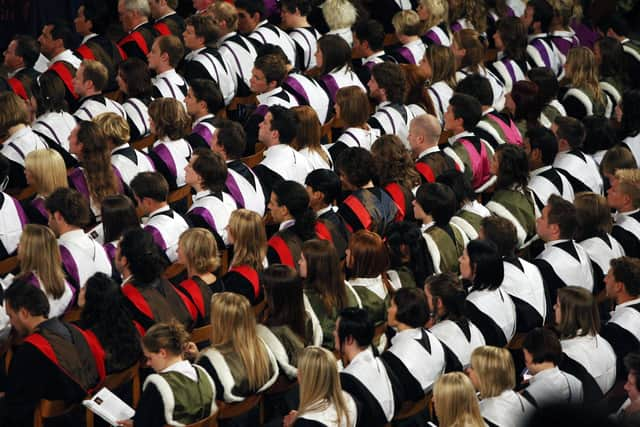Edinburgh University bosses condemned by 496 academics over 'cavalier disregard' for students, staff and standards
Hundreds of academics are warning that Edinburgh University risks inflicting “significant damage” to its own reputation by downgrading the scrutiny and standard of student degrees during ongoing industrial action.
Close to 500 staff at the ancient institution have signed an open letter condemning the way management is responding to a marking and assessment boycott that was launched last month at universities across the UK.
Advertisement
Hide AdAdvertisement
Hide AdThe signatories say they are “dismayed and alarmed” at Edinburgh University’s plans to carry on awarding degrees without the usual level of oversight and scrutiny, using similar contingency measures to those introduced at the height of the Covid-19 pandemic.


Staff say there is a “serious threat” to the integrity of the university’s degrees, and that bosses should instead be focussed on resolving the dispute over pay and conditions.
The letter says: "As teachers, we are appalled that our degrees and the welfare of our students, not to mention the health and welfare of staff, should be treated with such a cavalier disregard.
"We appeal to you to rethink your approach and find a response to the current dispute that does not disadvantage students or undermine the integrity of our degrees.”
The letter has been sent to Edinburgh University principal Sir Peter Mathieson and members of the senior management team.


The University and College Union (UCU) launched a marking and assessment boycott at 145 universities on April 20 amid a dispute over pay and conditions.
It is the latest in a series of waves of industrial action to hit the sector.
Students at Edinburgh are currently sitting exams but there is uncertainty about how any work submitted after April 20 will be assessed.
Advertisement
Hide AdAdvertisement
Hide AdThe university is putting in place contingency plans for classifying degrees, in part based on previously submitted coursework
However, the signatories of the open letter, not all of whom are participating in the boycott, say the integrity of degrees and assessments will be compromised if judgements are made without taking into account work that has been completed during the boycott.
They are “especially troubled” by the impact on final year undergraduates, who they say may find a “large proportion” of their honours assignments, potentially including dissertations, do not contribute to final degree classification.
There is also alarm at measures that could remove requirements for the usual level of external assessment.
"Plans to strip exam boards of necessary expertise and the oversight of external examiners, and to disregard work submitted during the boycott when calculating degree classifications, are likely to do significant damage to the reputation of the University of Edinburgh,” the letter says.
"Whether or not we are participating in the boycott, we all have a stake in the integrity of our assessments and degrees. These changes represent a serious threat to that integrity."
David Farrier, a professor of literature and the environment at the university, was among the academics expressing alarm.
"The letter reflects our deep concern at the university's approach to the marking boycott,” he said.
Advertisement
Hide AdAdvertisement
Hide Ad"We all want to see this situation resolved swiftly and in a way that doesn't disadvantage our students."
Claire Duncanson, a senior lecturer in international relations at the university, said: “It seems that in order to avoid paying staff fairly they would rather risk the reputation and quality of degrees.
"To me that smacks of vindictiveness towards staff and a real cavalier attitude towards students.
"If they really cared about students’ education they would invest in the people who do the teaching and supporting of students.”
Universities have responded in different ways to the industrial action, with some threatening salary deductions of up to 100% for staff taking part in the boycott.
Edinburgh University is understood to be planning to cut staff pay by 50 per cent while they are refusing to mark the work of students.
The pay cut was described by Edinburgh University Students Association as an “unwarranted attack” on the right of staff to take part in industrial action.
The student body has also said the “added uncertainty” being faced by students is “unfair” and “unjust”.
Advertisement
Hide AdAdvertisement
Hide AdAt a national level, there are currently believed to be no negotiations scheduled to try to resolve the dispute between UCU and the Universities and Colleges Employers Association.
The union has said the boycott will continue until an improved offer relating to pay and conditions is made by employers.
It has previously said: “The university will enact contingency plans to mitigate disruption to the delivery of learning and teaching, and student experience whilst maintaining academic standards.”
A University of Edinburgh spokesperson said: “The University has robust measures in place to reduce the impact of industrial action and we are making every effort to provide results, degree award outcomes and progression decisions to students by the published timelines.
“The marking and assessment boycott is part of a national campaign. Additional measures are being implemented across higher education institutions to ensure students’ ability to learn, progress and graduate is not compromised, while maintaining academic standards.
"The University’s Senate Academic Policy and Regulations Committee has agreed a range of temporary variations to provide greater flexibility to marking assessments and consider the ways industrial action has impacted learning, teaching and assessment. These are accompanied by conditions of use to ensure that academic standards are not compromised. Such variations will only be used in the event that activities have been significantly disrupted by industrial action and only when it is not possible to mitigate this using existing provisions of regulations and policies.”
Comments
Want to join the conversation? Please or to comment on this article.